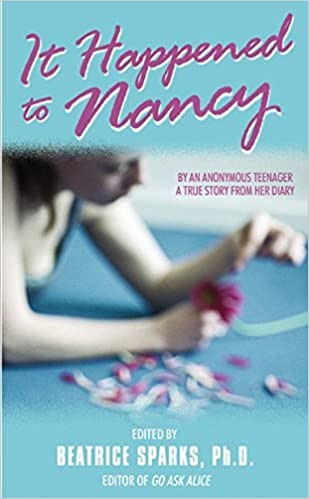
It Happened to Nancy
By an Anonymous Teenager, A True Story from Her Diary
فرمت کتاب
ebook
تاریخ انتشار
2010
Lexile Score
790
Reading Level
3-4
ATOS
5.4
Interest Level
9-12(UG)
نویسنده
Beatrice Sparksناشر
HarperCollinsشابک
9780062012722
کتاب های مرتبط
- اطلاعات
- نقد و بررسی
- دیدگاه کاربران
نقد و بررسی

February 28, 1994
Presented as a diary edited by the woman who prepared Go Ask Alice for publication, this book is soberly dedicated "to every kid who thinks AIDS can't happen to him or her" and includes an earnest foreword by one of Nancy's doctors ("I worry about all the beautiful, innocent young Nancys"). The story itself, however, begins on a nearly euphoric note: Nancy, 14, is caught up in her first romance. Breathless exuberance turns to horror, anger and despair after her gentle-seeming boyfriend plies her with spiked wine coolers and rapes her in her own mother's bed. A few months later, blood tests indicate that Nancy is HIV-positive. Nancy succumbs relatively quickly to full-blown AIDS, thus giving readers a rapid-paced and horrific account of the disease's progress. Though the wrenchingly optimistic diarist devotes little space in her journal to the specific details of the various opportunistic infections she suffers, her description of a rectal ulcer leaves a lasting impression. The thought-provoking narrative ends with Nancy's death and is followed by an informative series of questions and answers about rape and AIDS. Ages 12-up.

June 1, 1994
Gr 7 Up-A book based on the diary of a real teenager. Nancy, 14, is "a good little Catholic" girl, living in South Carolina. She has divorced parents who both love her, loyal friends, and a bright future. At a country western concert, she meets Collin, who presents himself as a lonely, orphaned college freshman. Naive Nancy is swept off her feet. Then he rapes her and disappears from her life. With her mother's support, she recovers from the assault and begins to enjoy her life again. She develops a romantic interest in Lew, who is serious and caring. Then she becomes ill; after a period of denial, she sees her family doctor. She is infected with the HIV virus. Until very late in her illness, she does not tell her friends her diagnosis. Despite ever frequent hospitalizations, Nancy never gives up hope. She graphically records the breakdown of her immune system and the resulting pain and loss of control. In a final burst of determination, Nancy sees through a collaboration that will result in the publication of her diary. This book is her legacy to other teens, left to them on her death at the age of 16. Readers will feel her joy, shock, and pain, and a personal sorrow at the loss of such an appealing young person. The narrative is followed by a question-and-answer chapter on HIV and AIDS. Elaine Landau's We Have AIDS (Watts, 1990) consists of interviews with stricken teens, as well as factual material. In contrast to the mostly private anguish of Nancy and her family, Ryan White and Ann M. Cunningham's Ryan White (Dial, 1991) recounts the very public tragedy of another heroic teen.-Libby K. White, Schenectady County Public Library, NY

June 1, 1994
Gr. 7-12. Fourteen-year-old Nancy, an asthmatic, meets 18-year-old Collin, a gentle, caring young man who appears to be the answer to her dreams--until he rapes her, leaving her HIV-infected. In spite of her rapid decline, explained in a note at the beginning of the book, as the result of her weakened immune system, Nancy leads a full, poignantly happy life because of the loving support of both friends and family."It Happened to Nancy" follows the YA-enticing diary format seen years ago in "Go Ask Alice," which also was edited by Sparks. And the same reservations remain. Is this really a teen's diary, or is it Sparks' attempt to convey the reality of adolescent susceptibility to HIV/AIDS in a format that will impact YA readers? Does the occasional place lapse (the Arizona time zone is earlier than South Carolina's) reflect editing sloppiness while Sparks was changing both names and places for privacy, or a fiction writer's lack of focus? There is no way of knowing. Although this is frustrating for adults who monitor the children's/YA field, it's doubtful that it will make much difference to the book's intended audience. YAs will devour this book just as they did its predecessor. Nancy's initial "love" relationship with Collin, her subsequent date rape, and the terror of her diagnosis will be real to teenagers, especially girls. And Nancy's support network is truly educational. Adolescents crave the kind of friends who stand behind Nancy throughout her ordeal (she even has a boyfriend!), as well as the loving relationship she has with both her parents, divorced but determined to work together during this tragedy.Sparks provides additional educational information at the end of the book, "Questions Nancy Wanted Answered About Rape and AIDS," a good thing, since Nancy asked her diary several questions without providing their answers in the body of the text. Parts of the book are graphic: Nancy worries about blood from her menstrual cycles, how to dispose of her tampons, and how to deal with her rectal ulcers, a common manifestation of AIDS. And, of course, she dies--the ultimate AIDS inevitability--unlike what happens in so many other books about teens and AIDS, both fiction and nonfiction. She progresses from happy-go-lucky junior-high-school student to AIDS patient to death in a spiral that will hold YAs' attention, without the didacticism of so many message-inherent titles. In spite of its flaws, Nancy's diary should be on our shelves. ((Reviewed June 1994))(Reprinted with permission of Booklist, copyright 1994, American Library Association.)

























دیدگاه کاربران